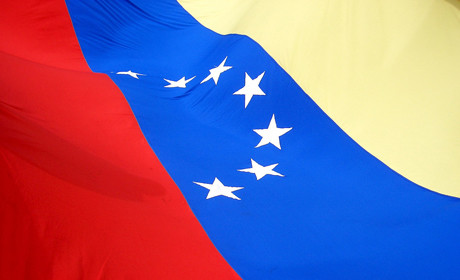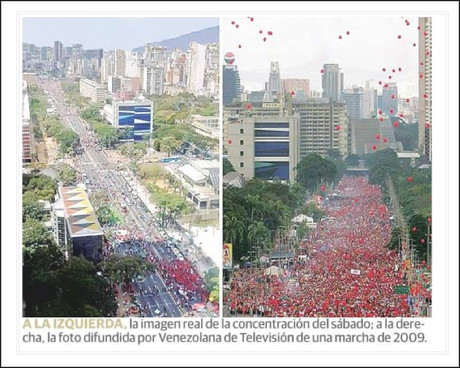
A group of Latin American journalists and developers have launched a new site to provide information around the civil unrest in Venezuela.
Venezuela Decoded, launched today, uses curated Twitter feeds and a timeline of verified events to present reliable sources of information as a "signal in the noise" of social media, said co-founder Martin Quiroga.
The curated Twitter lists "are trying to tap into the most authoritative, reliable sources on the ground," Quiroga, a Knight Fellow in charge of the programming side of the site, told Journalism.co.uk, "and we're trying to provide a summary of the most relevant stories through a human filtering process."
The Twitter lists are curated by the journalists and developers involved, all of whom have ties to Stanford University's Knight Journalism Fellowships, based on their own contacts and extensive conversations with Venezuelan news outlets to discern reliable sources.One of our biggest drivers here is the audience in Venezuela who don't have access to a clean signalMartin Quiroga, Venezuela Decoded
The lists include sources in English, sources in Spanish, accounts supporting the government and accounts supporting the opposition, with the express intention of "not giving any side an amplified voice", said Quiroga, although the nature of the content means it may not be verified. But this is being complemented by the additional timeline of verified information.
"We were very concerned by the fact that the censorship became part of the everyday situation," Ana Maria Carrano, a Venezuelan journalist and co-founder of Venezuela Decoded, told Journalism.co.uk of the reasons behind starting the site.
Twitter was temporarily blocked in the country in February, Carrano said, shortly before broadcasts from a Colombian television station covering the protests was taken off air in Venezuela. In addition, social media users on both sides of the conflict have been unreliable in the veracity of material they post, she said, so Venezuela Decoded aims to show both sides of the debate.
In one instance, a photograph was posted purporting to show a recent pro-government protest, with thousands of people lining a main avenue in Caracas in support of the Maduro regime. The image was in fact from a rally in 2009, as pointed out by Twitter users who recognised the "Pepsi Ball" was no longer a fixture of the city's skyline, having reportedly been removed in 2010.

A screenshot from tlaplan.info comparing two photos of a pro-government rally. On the left, a photograph of the rally in February this year, on the right, a photograph taken in 2009 and posted to Twitter as evidence of government support.
Elsewhere, opposition supporters have posted images of police violence in Egypt, or bodies in Syria, as evidence of government brutality in Venezuela.
"One of our biggest drivers here is the audience in Venezuela who don't have access to a clean signal," Quiroga said. "So we're trying to provide a reliable news feed for people on the ground, but also folks outside."
Alongside the Twitter lists, Venezuelan journalists Douglas Gomez-Barrueta and Mary Aviles curate verified information into a timeline, built using Timeline.js, to track the development of the crisis.
Today's launch is intended as a 'soft' launch for the site as it hopes to build more features to present the story in different ways without presenting too strong an editorial voice.
"The editorial point of view has been in the sources we have chosen," said Carrano, "but we have done the work in finding the most important sources to follow.Most of the information is getting out through Twitter and through social mediaAna Maria Carrano, Venezuela Decoded
"We're thinking about including maps to help you to understand how the conflict moves in the country as well."
A "who's who" of the crisis and a "dictionary" of terms and phrases are also planned, she said, but the next step will be to set up a filtering mechanism around the Twitter lists to help people organise and understand them better.
"It will be providing different portholes, different frames to look at the same vast volumes of Twitter information through different organising filters," said Quiroga, adding that computerised sentiment analysis – to assess the positive or negative feeling of tweets – could be built into the system at a later date.
"Another thing is to enable users to suggest people on the list to make it as transparent as possible – we'll vet them and make sure they are producing good content – but it's really trying to get at this problem [of finding the 'signal in the noise'] by providing different perspectives to peer into the information."
Venezuela Decoded holds similarities with Syria Deeply, the digital-first news portal on the Syrian civil war launched in 2012, in aiming to provide balanced reporting on a single topic that has entangled in the threads of misinformation social media users can create.
"We saw Syria Deeply and found it very interesting," Carrano said, "but when we started analysing the Venezuela conflict we thought we'd have to find a different way to approach it as most of the information is getting out through Twitter and through social media.
"That's why we're putting that much relevance on Twitter and focussing on filtering the Twitter sources."
Correction: The journalists involved in Venezuela Decoded have ties To Stanford University's Knight Journalism Fellowships, not the Knight Foundation, as previously stated.
Free daily newsletter
If you like our news and feature articles, you can sign up to receive our free daily (Mon-Fri) email newsletter (mobile friendly).
Related articles
- Fact-based journalism is under attack. What can we do about it?
- 15 online communities for journalists you should know about
- Investigating human trafficking, with ICIJ lead reporter Katie McQue
- What do journalists think about Threads?
- Micropayments on Twitter: good or bad for publisher's business models?









